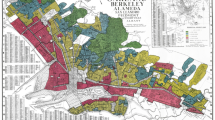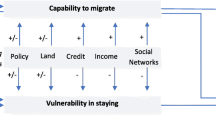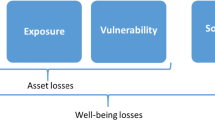Abstract
Much research has demonstrated that vulnerable people fare more poorly than non-vulnerable ones in disasters and crises across a variety of outcomes—including mental and physical health, disaster aid received, re-housing processes, and overall satisfaction with recovery. But little is known about how natural hazards change the social and political environment for those vulnerable groups. Some have argued that shocks raise the consciousness of civil society and decision makers so that conditions improve for vulnerable groups, while others believe that disasters have little or even negative impact on their status in society. This paper uses a new panel dataset across 17 years (1999 through 2015) of Japan’s 47 prefectures to investigate how disasters impact discrimination rates for vulnerable groups, including women, the elderly, foreigners, and those with disabilities. Controlling for demographic and social factors, we find that disasters actually reduce discrimination against certain vulnerable groups—especially women and the elderly—while having no measurable impact on discrimination against other groups—foreigners and the disabled. These results bring with them important policy recommendations for local residents, disaster managers, and decision makers.

Similar content being viewed by others
References
Aldrich DP (2012) Building resilience: social capital in post-disaster recovery. University of Chicago Press, Chicago
Aldrich DP (2019) Black wave: how networks and governance shaped Japan’s 3/11 disasters. University of Chicago Press, Chicago
Aldrich DP, Forester S, Horhager E (2018) Triggers for policy change: the 3.11 Fukushima meltdowns and nuclear policy continuity. Environ Politics 28(7):1214–1235
Alexander D (2011) Disability and disaster. In: Wisner B, Gaillard JC, Kelmen I (eds) Handbook of hazards and disaster risk reduction and management. Routledge, London, pp 384–394
Barton AH (1969) Communities in distress: a sociological analysis of collective stress situations. Anchor, NY
Birkland T (1996) Natural disasters as focusing events: policy communities and political response. Int J Mass Emerg Disasters 14(2):221–243
Boin A, McConnell A, T’Hart P (eds) (2008) Governing after Crisis: The Politics of Investigation, Accountability, and Learning. Cambridge University Press, London
Choi S-W (2009) The effects of outliers on regression analysis. Q J Political Sci 4:153–165
Enarson E, Fothergill A, Peek L (2007) Gender and disaster: foundations and directions. In: Rodríguez H, Quarantelli EL, Dynes RR (eds) Handbook of disaster research. Springer, New York, pp 130–146
Fritz CE (1961) Disaster. In: Merton RK, Nisbet RA (eds) Contemporary social problems. Harcourt, Brace, and World, New York
Keerthiratne S, Tol R (2018) Impact of natural disasters on income inequality in Sri Lanka. World Dev 105(C):217–230
Lee A, Fernandex L (2019). Elderly and disabled residents, including original Rosie the Riveter, left in dark for days. KTVU 30 October 2091
Matsubayashi T, Sawada Y, Ueda M (2013) Does the installation of blue lights on train platforms prevent suicide? A before-and-after observational study from Japan. J Affect Disord 147(1–3):385–388
Ministry of Civil Defence & Emergency Management [MCDEM] (2013) Including people with disabilities Information for the CDEM sector https://www.civildefence.govt.nz/assets/Uploads/publications/is-13-13-including-people-with-disabilities.pdf. Accessed 13 Sept 2020
Nahar N, Blomstedt Y, Wu B, Kandarina I, Trisnantoro L, Kinsman J (2014) Increasing the provision of mental health care for vulnerable, disaster affected people in Bangladesh. BMC Public Health 14:708–717
Quarantelli EL, Dynes RR (1972) When disaster strikes: it isn’t much like what you’ve heard & read about. Psychol Today 5(9):66–70
Rohrich Z (2018) As disasters strike, advocates worry FEMA policy changes put disability community at risk. PBS News Hour 12 October https://www.pbs.org/newshour/nation/as-disasters-strike-advocates-worry-fema-policy-changes-put-disability-community-at-risk. Accessed 13 Sept 2020
Roth M (2018) A resilient community is one that includes and protects everyone. Bull Atomic Sci 74(2):91–94
Samuels R (2013) 3.11: disaster and change in Japan. Cornell University Press, Ithaca, NY
Solnit R (2009) A paradise built in hell: the extraordinary communities that arise in disaster. Viking, New York
Wisner B, Blaikie P, Cannon T, Davis I (2004) At risk: natural hazards, people's vulnerability and disasters. Routledge, New York
Yamamura E (2015) The impact of natural disasters on income inequality: analysis using panel data during the period 1970 to 2004. Int Econ J 29(3):359–374
Ye M, Aldrich DP (2019) Substitute or complement? How social capital, age and socioeconomic status interacted to impact mortality in Japan’s 3/11 Tsunami. SSM-Population Health 7(100403):1–12
Author information
Authors and Affiliations
Corresponding author
Ethics declarations
Conflict of interest
There is no conflict of interest with this study.
Additional information
Publisher's Note
Springer Nature remains neutral with regard to jurisdictional claims in published maps and institutional affiliations.
Appendix
Rights and permissions
About this article
Cite this article
Ye, M., Aldrich, D.P. How natural hazards impact the social environment for vulnerable groups: an empirical investigation in Japan. Nat Hazards 105, 67–81 (2021). https://doi.org/10.1007/s11069-020-04295-z
Received:
Accepted:
Published:
Issue Date:
DOI: https://doi.org/10.1007/s11069-020-04295-z




